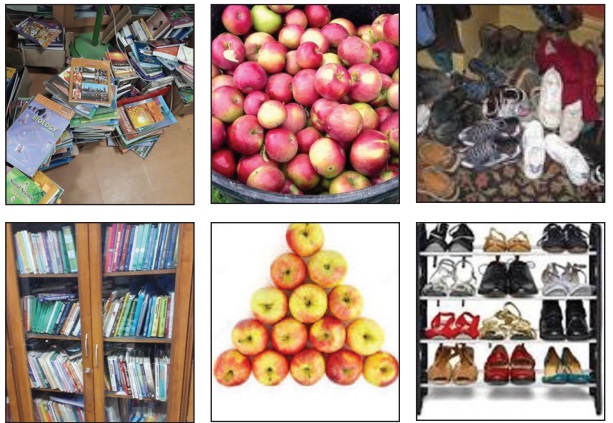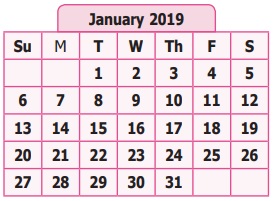Information Processing | Term 3 Chapter 5 | 6th Maths - Arranging things and putting them in order | 6th Maths : Term 3 Unit 5 : Information Processing
Chapter: 6th Maths : Term 3 Unit 5 : Information Processing
Arranging things and putting them in order
Arranging things and putting them
in order
In day-to-day life, sorting things such as arranging
books on shelves, lining up foot wears in racks, segregating vegetables in trays,
keeping household things in an almirah, arranging provisions in a cupboard, listing
out expenditure etc, become inevitable. These activities help us to recall the things
available, to have an easy access, avoid wastage and so on. Similar kind of arrangements
are available in numbers also. Example : Calendar.

Discuss the following situations in groups
Situation 1
Suppose you need to arrange 100 books of same size
in a shelf. The shelf has 10 rows and each row can accommodate 10 books. Besides,
each book has an ID number written on it. How will you arrange the books based on
their ID numbers, the smallest number should be on the left top row and the greatest
ID number must on the right bottom row.
Discuss the following questions
i) Are there different
ways to arrange the books?
ii) How do you know
that one method is better than the other?
iii) If two persons
together do the arrangement, how will you divide the work between them?
iv) If the books do
not have any numbers written on them, how will you arrange them?
v) Is arranging them by number better than arranging
them by size? why?
Situation 2
Suppose you have saved
some coins in your piggy bank. If you want to know the amount saved, what can you
do?
i) What are the ways to
count the amount?
ii) Which is the easy
way to count?
iii) Can the coins be
arranged by their value?

Situation 3
Have you seen the garbage being sorted out in the
streets? Some materials are bio-degradable and some are not bio-degradable like
hospital wastes, plastics, glass materials and other wastes. How are the garbages
sorted?

Note
The teacher may discuss this with
students to create more awareness on segregating of waste, at the source.
Example 4
Observe the calendar showing the month of January
2019.
Answer the following questions
i) Sort out the prime and composite numbers from
the calendar.
ii) Sort out the odd and even numbers.
iii) Sort out the multiples of 6; multiples of 4;
the common multiples of 4 and 6 and LCM of
the two numbers.
iv) Sort
out the dates which fall on Monday.

Solution
i) Prime numbers = 2, 3, 5, 7, 11, 13, 17, 19, 23, 29, 31
Composite numbers = 4, 6, 8, 9, 10, 12, 14, 15, 16, 18, 21, 22,
24, 25, 26, 27, 28, 30
ii) Odd numbers =
1, 3, 5, 7, 9, 11, 13, 15, 17, 19, 21, 23, 25, 27, 29, 31
Even numbers = 2, 4, 6, 8, 10, 12, 14, 16, 18, 20, 22, 24, 26,
28
iii) Multiplies of 6 = 6,
12, 18, 24, 30,
Multiplies
of 4 = 4, 8, 12, 16, 20, 24, 28
Common multiples
= 12, 24
LCM = 12
iv) Monday falls on = 7, 14, 21, 28
ICT CORNER
Information Processing
Expected Outcome

Step 1
Open the Browser by typing the URL Link
given below (or) Scan the QR Code. GeoGebra work sheet named “Information Processing”
will open. There is a worksheet under the title Fibonacci Sequence.
Step 2
Move the sliders to move Red point vertically
and horizontally along the numbers and check how Fibonacci sequence is formed.

Browse
in the link:
Information Processing: https://ggbm.at/dfktdr6k
or Scan the QR Code.
Related Topics